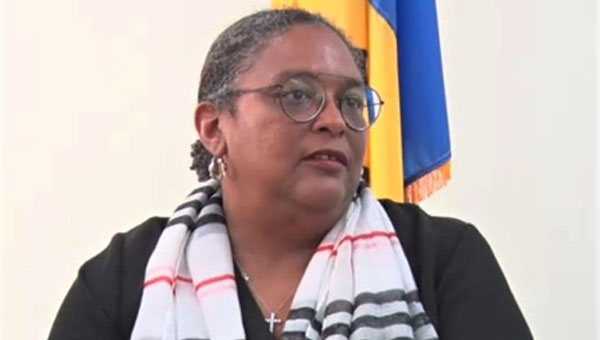BRIDGETOWN, Barbados, February 13, 2020 (CMC) – Prime Minister, Mia Mottley, has warned Barbadians that they cannot survive in isolation, as she piloted an amendment to existing legislation, on Tuesday night, in keeping with the freedom of movement of Caribbean Community (CARICOM) nationals.
Mottley, who is also Chair of the 15-member regional integration grouping, told legislators that Barbados, with a population of 280,000, cannot survive on its own, “because we do not have enough economic activity on our own”.
Piloting the CARICOM Freedom of Movement of Persons Amendment Bill, Mottley said that as a result, Bridgetown should be more welcoming of its regional neighbours, under the terms of the CSME that allows for the free movement of goods, skills, labour and services.
“Barbados has a trade surplus with one region in the world, and that is the Organisation of Eastern Caribbean States (OECS), as well as with Guyana.
“So when xenophobic statements come, we forget to recognise our economic stability is linked to our neighbours, and Trinidad is where the second or third largest source of investment into Barbados comes from.
“And when we add, that one in every five visitors to Barbados comes from the CARICOM region, we begin to understand why the political party I lead, has a constitutional objective to pursue regional integration,” she told legislators.
Prime Minister Mottley said that the proposed legislation “defines very clearly what is meant by an agricultural worker, an artisan, an artist, a security officer, and we have also used the opportunity to clean up aspects of its functioning, to define what a community national is, a qualifying CARICOM State is” ….
She said Barbados is also “allowing for provisional entry for dependents of the person (for example spouses or young children), and over the last 18 months, we have brought clarity to the Protocol on Contingent Rights to allow people to see what benefits they can get, in moving from country to country”.
The prime minister said that Barbados was once a major exporter of labour in the years, immediately following emancipation in 1838, and that once again, one of the dilemmas the region faced, was that countries, like Guyana and Suriname, despite having enormous potential for economic growth following the discovery of significant oil reserves, are short on people with the requisite skills to profit from it.
“Guyana is the size of England, Scotland and Wales combined, but while the UK has a population of 64 million, Guyana has 741,000 people. Suriname is bigger than the Netherlands but its population is 563,402.
“Ironically, they are the least populated countries in CARICOM, but they are expected to grow to unprecedented levels, shortly. Even with the best will in the world, we will have to work together, because if we don’t, nature abhors a vacuum and others will come in and fill it.”
Mottley, who will host regional leaders for their inter-sessional summit, next week, said that “we have to recognise that there is great strength in unity, and we need to build out a community greater than the sum total of us all.
“The precept, upon which the Revised Treaty of Chaguaramas was signed, says we will treat each other better than anyone else who does not belong to the grouping, the most favoured nation precept, so if we take that spirit, we must recognise we need to look at each other, before we look at anyone else.
“When the two Energy Ministers from Barbados and Trinidad signed an agreement to work together a year ago, it recognised Trinidad has a century of working with oil and natural gas, while Barbados does not,” she said, adding “it is better to work together than to have someone from far and away to work with us and benefit themselves, more than we do.”
But Prime Minister Mottley said that there’s nothing in the proposed legislation that would allow persons, who were deported from the island, the right to stay.
“So, in all that we are doing, a country still has the right to protect itself from those who were deported for any particularly serious purpose, and the country has the right to take protective action to protect its borders, this normally relates to national security, but also public health, on occasion,” she added.
 Pride News Canada's Leader In African Canadian & Caribbean News, Views & Lifestyle
Pride News Canada's Leader In African Canadian & Caribbean News, Views & Lifestyle





